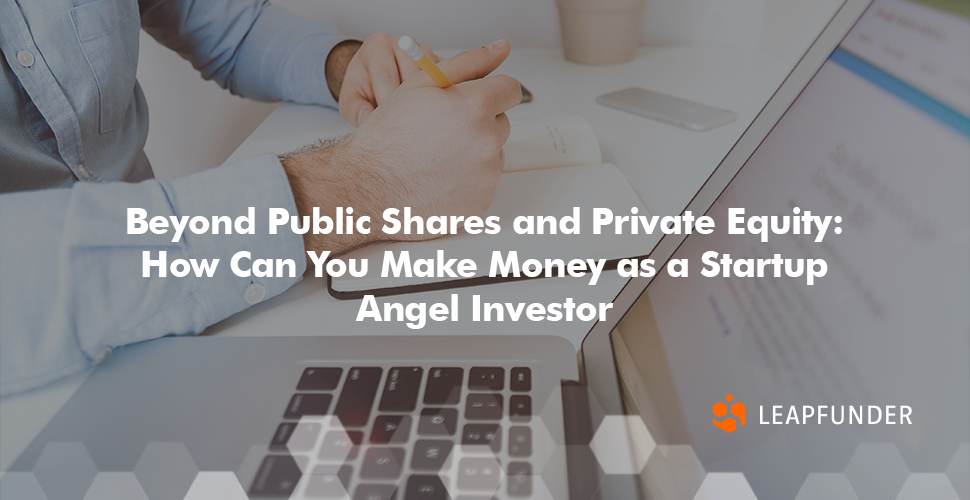Have you previously invested in public shares and bonds, or perhaps real estate, and you’d like to try investing in startups as a business angel? You’re not the first! Being a part of a new company’s growth is a highly rewarding experience. Startup investing requires a lot more patience before you get a tangible return, and it is a highly skilled activity.
This is not the world of the price to earnings ratio, the equity analyst, or the index tracker. Instead, it is the world of judging founding teams, performing your own due diligence, and helping your portfolio companies structure a funding roadmap based on convertibles and private equity transactions. In other words, startup investing is not about convenience. For many investors, it is probably more about the extra rewards and challenges that come along the way. Before embarking on this journey, we feel there are a few things every starting business angel should consider:
1. You need to build a portfolio
It turns out that it’s very hard to identify a company that will be a ‘rocket’. Even experienced investors will tell you story after story about great companies that they didn’t invest in because the concept just seemed silly and futuristic at the time. Simultaneously the big success stories in any portfolio are often surprising and seem like blind luck. To catch a hit your best approach is to make sure that you have a broader portfolio, which will act as a broad ‘net’. Many investors believe that it is actually a lot easier to identify which startups are at risk of going all the way down to zero. That happens if the team is not committed, for example.
2. You need to invest your budget slowly over time
When you start investing you will likely make a few mistakes. Luckily bad investments tend to fail fast. (At the same time successful companies take longer to mature.) Since you will see your first failures within a few years we generally recommend investing only small amounts in the first 3 years. That way your failures will just be learning experiences.
Even mature investors will make sure that they release cash to portfolio companies over time, by gradually increasing their position in follow-up funding rounds. In later rounds, you can direct your cash towards your portfolio companies that are showing the best progress within your portfolio. That way you have a broad ‘net’ of smaller investments, but you are making sure that most of your capital is gradually being allocated to the best ones.
3. You probably need investor friends
It’s always tough to do due diligence on a startup on your own. Your own limitations and biases will be noticeable. It is common for experienced angel investors to form little talking groups. They might or might not invest together, but they will certainly discuss opportunities among themselves before making their decisions. This is an important aspect of early-stage investment, and we recommend beginners should network actively with other investors.
4. Your input into the company should increase its chances
Investing in shares on a stock exchange is driven by numbers. You often have no idea who is actually running the company that you are committing your capital to. Startup investing is different: the human connection is important. Business angels don’t only bring money to the table, they bring knowledge, network and expertise. That’s often crucial for startup success. Scientific studies have shown that ventures backed by angel investors are more likely to remain in business longer, have better growth, and witness a greater rate of return. Please remember that there is such a thing as ‘back-seat driving’. You should not interfere inside the company, nor interfere with the management’s ability to run the company. But your presence, foresight, and guidance should help.
5. Your returns could be high, but when?
Leapfunder research has shown that skilled investors can generate very strong returns over time. However, it takes patience. It can easily take more than 6 years before your first big cash exits come through. Until that time you can see that the company is progressing and growing, but you cannot sell your shares and get your cash out. While running a startup as a founder is fast-paced with emotional ups and downs… startup investing as an angel is a slow game.
6. If you are successful, it might turn into your job, seriously…
We have often seen that investors that perform really well as business angels, eventually start working together with other investors and form a venture capital fund. Once angels figure out how to scout good startups and they are generating good returns, then others will provide them with capital to invest on their behalf.
Leapfunder is a good starting point for these kinds of investors. Although we make investing a lot more convenient, we do make sure that each investor is doing full due diligence themselves, based on the information provided in our dataroom. The intellectual process you go through is the same as that of a mature venture capitalist, and several of the big-name VC funds send their analysts to our online Angel Clinic for basic training. By investing with us you are getting yourself ready to join this world.
Invest in the next generation of startups and support innovation by signing up at Leapfunder. Here you will find plenty of active angel investors and deals to start your early-stage investment career.
Join our network of startups & investors!

